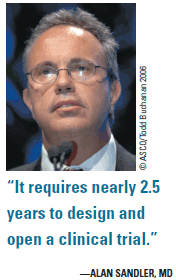Cancer luminary lambasts slow-moving U.S. clinical trials
The clinical trials program in the U.S. is broken and apparently nobody has noticed,” Vincent T. DeVita, Jr., MD, wrote in a recent editorial in Nature Clinical Practice Oncology (5:683, 2008), of which he is editor-in-chief.
ABSTRACT: In a recent editorial, Vincent T. DeVita, Jr., MD, decried a ‘broken’ system, where lengthy start times are the rule and not the exception.
"The clinical trials program in the U.S. is broken and apparently nobody has noticed," Vincent T. DeVita, Jr., MD, wrote in a recent editorial in Nature Clinical Practice Oncology (5:683, 2008), of which he is editor-in-chief. Dr. DeVita referred to a new study showing that phase III ECOG trial protocols require about 800 days from conception to activation (Clin Cancer Res 14:3427-3433, 2008).

"800 days! Can you imagine that? The response of the NCI Director was a vow to cut the time to approval in half. At 400 days the system would still be broken," he wrote.
The median 800-day turnaround was documented in two studies from the Center for Management Research in Healthcare (cMRHc) at Vanderbilt University: the recently published ECOG study and an earlier study that examined CALGB phase III trials (J Clin Oncol 24:4553-4557, 2006).
While the 800 days may shock many in the cancer care community, David Dilts, PhD, and Alan Sandler, MD, co-directors of the cMRHc, are not surprised. By visiting clinical trial sites, conducting interviews, and studying operating procedures, they have determined that nearly 1,000 steps are taken before a U.S. phase III trial is up and running. And once a trial is activated, an additional 120 days are required to get the trial in gear at an individual cancer center.
"This means that it requires nearly 2.5 years to design and open a clinical trial," Dr. Sandler told Oncology News International. "Imagine the difficulty with this. Science moves quickly, and something that was a good idea in 2006 may not be so good in 2009."

The cMRHc team determined that paperwork is clogging up the process. "We used to think the institutional review board process was at fault, but in fact it is more about the contracting and budgeting, and the language of the contracts," Dr. Sandler said, adding that about 50% of grants require re-negotiation.
In a 2006 study of trials at the Vanderbilt-Ingram Cancer Center and its network sites (J Clin Oncol 24:4545-4552, 2006), Drs. Sandler and Dilts showed that the time for IRB review and approval was actually one of the fastest processes (median 47 days), compared with the scientific review committee review and approval (median 70 days) and contracts and grants review (median 79 days).
Some have suggested that contract "templates" be used to standardize the agreements and shorten approval time, which might help, Dr. Sandler added, but he predicted, "you will always have different personnel, different attorneys wanting to reinvent the wheel."
‘Hopelessly over-regulated'
Dr. DeVita expressed first-hand knowledge of these delays. "At my own institution, I reside on many committees involved in protocol review, and I can say with authority that we are hopelessly over-regulated," he said.

Dr. Sandler pointed out that at one institution, 87 steps and 29 signatures were required to launch a trial. "Did that many people have to sign off at one center?" he asked. "We have to cut the time it takes to open a trial so more current, viable, and engaging studies will be initiated in a timely fashion."
The Vanderbilt group has received preliminary approval for an article, in a future issue of the Journal of Clinical Oncology, on clinical trial timing and process from the perspective of the NCI Cancer Therapy Evaluation Program (NCI-CTEP), said Steven Cheng, PhD, from cMRHc.
Oncology Peer Review On-The-Go: Cancer Care Management During the COVID-19 Pandemic
October 28th 2020The newest episode of Oncology Peer Review On-The-Go speaks with 2 authors of an article from the October Issue of the journal ONCOLOGY focusing on effective cancer care management during the coronavirus pandemic.